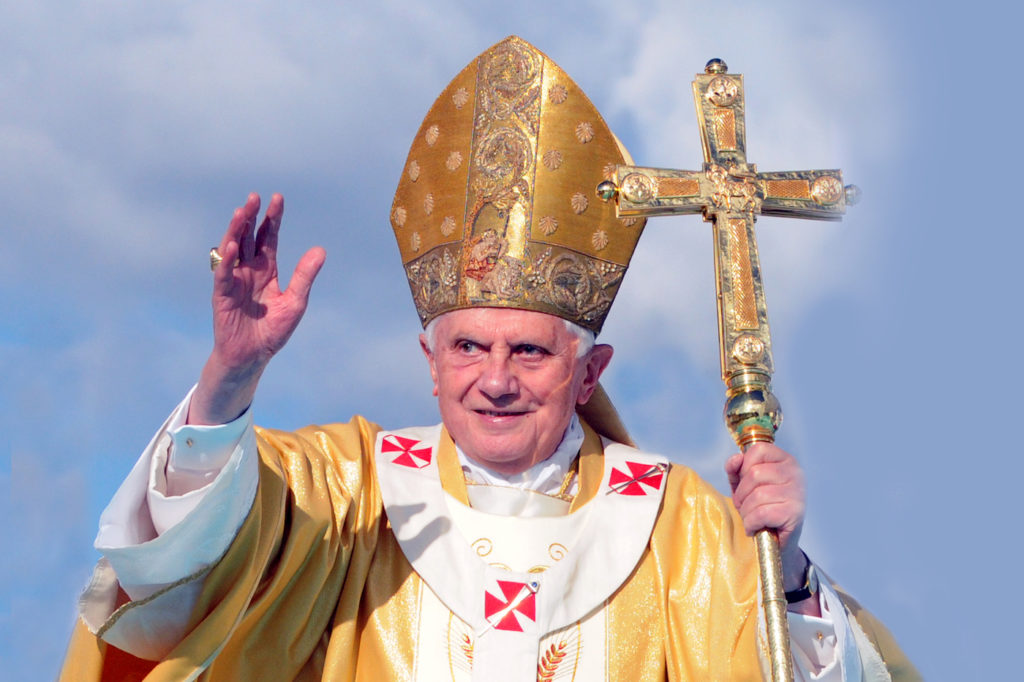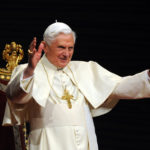Presiding at the mass to elect a new pope in 2005, then-Cardinal Joseph Ratzinger memorably identified the malady affecting all forms of knowledge, belief, values, and culture in our modern world: “we are building a dictatorship of relativism that does not recognize anything as definitive and whose ultimate goal consists solely of one’s ego and desires.” With this pithy diagnosis, not wholly original but rarely stated with the clarity and rhetorical force of this already aged pastor, the man who would just days later become Pope Benedict XVI crystallized—for people of all faiths and no faith at all—what was at stake in our now well-advanced civilizational struggle.
The moral error of the West, so powerfully captured in John Paul II’s well-known shorthand, “The Culture of Death,” would now be rooted in a prior intellectual error: the exhaustion of reason and her replacement with a near totalitarian regime of relativism and intellectual ennui. In the years before and after Benedict’s pontificate, this well-regarded theologian and academic would take the battle to the brahmins of secularism. He did not indulge in cultural retreat, nor was he waiting for a doubtless very different Benedict. On the contrary, this Benedict would defend both reason and tradition from within the very heart of our modern West like arguably no other Bishop of Rome before him.
While Benedict’s intellectual achievements were beyond impressive to a young orthodox Jewish rabbi tutored in German philosophy and contemporary theology, I confess it took me a little more time to warm up to this new, more reserved, pontiff. The contrast in temperament to the saintly John Paul II, with his loving personalism and easy charm, was particularly striking. This insight was hardly unique to me. Perhaps my initial hesitation toward Benedict had more to do with Karol Wojtyła’s role as a Polish partisan, risking his life in forests to save Jewish friends and neighbors, while hundreds of miles to the West, a young Joseph Ratzinger was wearing the uniform of the National Socialist Youth Movement and, later, the Wehrmacht. Of course, history is clear that Ratzinger’s father was a known Nazi-resister and that the young Ratzinger had absolutely no use for National Socialism. Still, the images are hard to shake.
Benedict would defend both reason and tradition from within the very heart of our modern West like arguably no other Bishop of Rome before him.
Start your day with Public Discourse
Sign up and get our daily essays sent straight to your inbox.But taking Benedict at his word over a long clerical career, this new pope had nearly as much reverential regard for his “elder brothers in the faith” as his famously philo-semitic predecessor. At the same time, his deeper appreciation of the eternal bond between God and His people Israel—of the flesh—is tempered by orthodox Catholic teaching on the exclusive salvific power of Christ. Thus, Benedict’s affirmation, following in the catechetical footsteps of John Paul II, that the “gifts and the call of God are irrevocable” (Rom. 11:29) is complexly woven into more traditional claims about the unique salvational role of Christ. As Conciliar scholar Gavin D’Costa chronicles Benedict’s pronouncements on Jews and Judaism, he underscores that this “pontificate is marked by an increasing use of Jewish terms, familiarity with Jewish Rabbinical literature, and a clear sense of contemporary Judaism as being the covenant people of God.” All this while still insisting, in accordance with the basic rendering of Redemptoris Missio (1990) and Dominus Iesus (2000), that salvation is granted through the exclusive aegis of Jesus Christ. Benedict maintained this difficult dialectic with a noble integrity, letting tradition play a decisive role in doctrinal questions about salvation.
The defense of tradition, especially in a liturgical key, is another signature feature of Benedict’s pontificate. Restoring his flock’s right to the Tridentine Mass is, for Catholic traditionalists, Benedict’s signal accomplishment (and, concomitantly, his removal of the excommunication from the Lefebvrists). Jews, on the other hand, were concerned when in 2008 Benedict reintroduced the Latin Rite Good Friday liturgy, which called for the conversion of the Jews. Benedict amended the full text of the older prayer, removing some of the pre-Conciliar language, but retained the calls for mission and conversion.
Jews concerned over a clearly internal Catholic matter, namely the propriety and doctrinal purity of a matter of liturgy, should remember the late, great Rabbi Joseph B. Soloveitchik’s injunction in his 1964 agenda-setting essay, “Confrontation.” For Soloveitchik, the deepest form of respect for the integrity of another faith community—and hence, one’s own—is demonstrated when we avoid the imposition of our own faith’s standards or interests onto the faith of the other. This prudent counsel will guide the remainder of my reflections on Benedict, allowing us to dwell on two final, civilization-scale, themes, returning us to where we began: Benedict’s singular defense of European culture and the West, and his restoration of reason as the crowning achievement of that very civilization under duress.
Benedict was, simply put, a man of Europe, a man of the West. A proud son of Bavaria and Germany, of course, but more than any great religious leader of the twentieth and, now, twenty-first centuries, Benedict had the soul of a European. Music, art, belles-lettres, history, philosophy, political thought, theology, Benedict ranged over these contributions to culture like a colossus. Benedict’s analysis of the “peculiar Western self-hatred that is nothing short of pathological” that continues plaguing our culture is both devastating and prophetic. “All that it sees in [the West’s] own history is the despicable and destructive; it is no longer able to perceive what is great and pure. What Europe needs is a new self-acceptance, a self-acceptance that is critical and humble, if it truly wishes to survive.”
Jews and Christians both must rally around Benedict’s call to defend and celebrate the legacy of the West: the rule of law, the respect for the dignity of man, the institutions of marriage and family, the love of our neighbor, the one most like us, which becomes the basis for the love of the truly other, even—and especially—the one most unlike us. These are the gifts of the West. True, a West that has not always lived its ideals. Benedict knew this gap, saw this schism with his very own eyes. But without those ideals, civilization, and not merely the civilization of Jerusalem and Athens, of Rome, London, and Paris but all civilization, must come to a sorry, still end. And Benedict was one of her most gifted and courageous champions.
What so many liberal critics missed at the time—and still do—is that it was Benedict, not the university professors in their shimmering towers, who was making the case for reason.
This brings us to Regensburg, that great Bavarian university town, where Benedict delivered his most important address to the world. Benedict’s idea in this address, which was titled “Faith, Reason, and the University—Memories and Reflections,” that the decline of the West owed its pedigree to the nominalism of Duns Scotus, was not entirely novel: Richard Weaver made this teaser of an argument in his genre-bending Ideas Have Consequences in 1948. But it was Benedict, the theologian with peerless academic credentials, who would give this provocative argument the fully pedigreed articulation it deserved. And in doing so, Benedict laid bare the voluntarism within the most dangerous streams of Islam. He respectfully but unapologetically critiqued the Prophet for the morally dubious implications of voluntarism, implications that were not merely philosophical, just five years after 9/11. In a world of fatwas on Salman Rushdie, Charlie Hebdo shootings, and ISIS beheadings, Benedict’s teaching is quite simply an act of courage, a master class in heroism.
What so many liberal critics missed at the time—and still do—is that it was Benedict, not the university professors in their shimmering towers, who was making the case for reason. Benedict defended a universality that could connect people of differing faiths, nationalities, and races in constructive dialogue. It was the Enlightenment’s restrictive and narrowed reason that was not only precluding the possibility of reasoned faith from playing a role in the public square, but also, perhaps more dangerously, preventing the possibility of reason itself from saying anything significant in a public way at all.
Not everything Benedict says at Regensburg is unchallengeable. His providential reading of the development of Hebrew thought and Greek philosophy under the aegis of the early Church is suggestive, even if his understanding of God’s revelatory “I Am” (Exodus 6:1) betrays a more characteristically Greek metaphysic, with its emphasis on Being, and not a Hebrew metaphysic—a reading, by the way, that belies the original Hebrew language of the verse in question. (The great medieval Jewish philosopher, Maimonides, had the same reading, so Benedict is in good, if not exclusively-so, company.) Still, it is hard not to marvel at the clarity of Benedict’s exposition and the real-world implications stemming from a university address delivered by a famous former faculty member.
Is it any wonder, then, that my colleague and I assign Benedict’s Regensburg Address as required reading in an eleven-day summer course on the nature of reason for bright Jewish students interrogating the vocation of liberal learning? Requiescat in Pace. May his name be a blessing.














